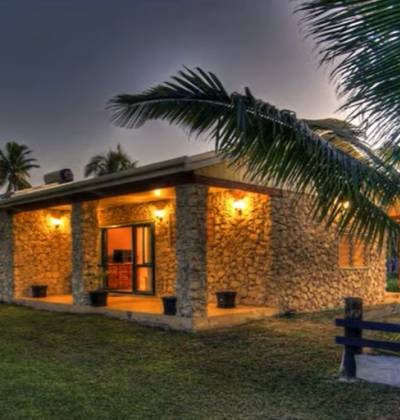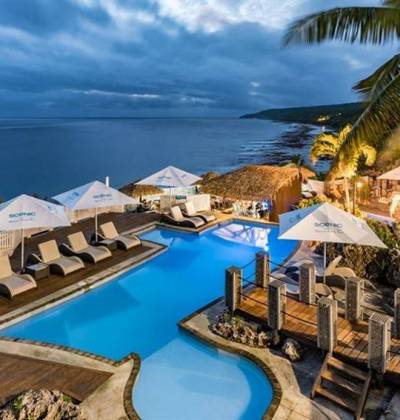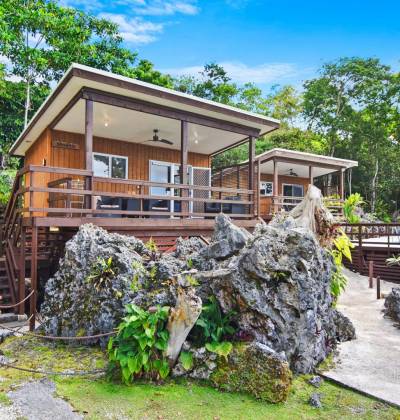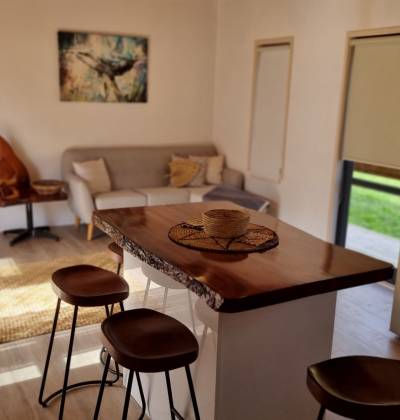Introduction to Niue
Niue, a small self-governing island in the South Pacific, is a hidden treasure for adventurous travelers seeking a unique and off-the-beaten-path destination. Known as the "Rock of Polynesia," Niue is famous for its dramatic limestone cliffs, crystal-clear waters, and warm, welcoming locals. Despite its small size and remote location, Niue offers a wealth of natural beauty and cultural richness, making it an ideal destination for those looking to explore unspoiled landscapes and immerse themselves in an authentic island experience.
Geography and Natural Beauty
Niue is one of the largest raised coral atolls in the world, covering an area of about 260 square kilometers. Its unique topography is characterized by rugged limestone cliffs that rise dramatically from the ocean, creating a striking contrast against the turquoise waters that surround the island. The coastline is dotted with numerous caves, chasms, and blowholes, many of which are easily accessible and offer breathtaking views of the sea.
One of the island's most notable natural features is the extensive network of underwater caves and coral reefs that encircle Niue. The island's waters are exceptionally clear, with visibility often exceeding 100 feet, making it a paradise for snorkelers and divers. The coral reefs are home to a diverse array of marine life, including colorful fish, turtles, and even dolphins and whales. The Anapala Chasm, a deep freshwater cave, is one of the island's most popular attractions, offering visitors the chance to swim in its cool, clear waters.
The inland areas of Niue are equally stunning, with lush tropical forests, limestone formations, and hidden valleys waiting to be explored. The island's interior is crisscrossed by a network of trails that lead to various points of interest, including ancient burial sites, traditional villages, and scenic lookout points. The Huvalu Forest Conservation Area, which covers a significant portion of the island, is home to a variety of endemic plant and animal species, making it a haven for nature lovers and birdwatchers.
Cultural Heritage and Traditions
Niue's cultural heritage is deeply rooted in Polynesian traditions, and the island's small population of around 1,600 people takes great pride in preserving their customs and way of life. The Niuean language, which is closely related to the languages of Tonga and Samoa, is widely spoken, and traditional music, dance, and crafts remain an integral part of daily life.
Visitors to Niue can experience the island's rich cultural heritage firsthand by attending one of the many community events and festivals held throughout the year. The annual Niue Constitution Day celebrations, which take place in October, are a highlight of the island's cultural calendar, featuring traditional dances, music performances, and feasts. The island's churches also play a central role in community life, and attending a Sunday service is a great way to experience the strong sense of community and spirituality that defines Niuean culture.
Craftsmanship is highly valued in Niue, with traditional weaving, carving, and tapa cloth-making being important cultural practices. Women are typically responsible for weaving intricate mats, baskets, and hats from pandanus leaves, while men often engage in wood carving, creating beautiful sculptures and tools from native hardwoods. Visitors can purchase these handmade items as souvenirs, providing a tangible connection to Niue's cultural heritage.
Adventure and Outdoor Activities
Niue is a paradise for outdoor enthusiasts, offering a wide range of activities that take advantage of the island's natural beauty and rugged terrain. The island's extensive network of caves and chasms is a major draw for adventurers, with opportunities for caving, rock climbing, and abseiling. Many of these caves, such as the Vaikona Chasm and the Talava Arches, are easily accessible and offer stunning views of the surrounding landscape.
The island's coastline is a playground for water-based activities, with snorkeling, diving, and fishing being among the most popular. The clear waters and abundant marine life make Niue one of the best diving destinations in the Pacific, with several dive operators offering guided tours to the island's top dive sites. Snorkelers can explore the shallow reefs and underwater caves, while anglers can try their hand at deep-sea fishing, with the chance to catch tuna, wahoo, and other prized game fish.
Whale watching is another must-do activity on Niue, with humpback whales frequenting the waters around the island from July to October. These majestic creatures come to Niue to mate and give birth, and visitors can often spot them from the shore or join a guided boat tour for a closer look. The island's small population and lack of mass tourism mean that whale encounters are often intimate and uncrowded, providing a truly unique experience.
For those who prefer to stay on land, Niue's network of hiking and cycling trails offers a fantastic way to explore the island's interior. The cross-island track, which runs from the eastern to the western coast, takes hikers through dense forests, past ancient burial sites, and up to scenic lookout points with panoramic views of the island. Cycling is also a popular way to get around, with quiet roads and well-marked trails making it easy to explore at your own pace.
Getting There: Accessibility and Travel Tips
Niue's remote location in the South Pacific means that getting there can be a bit of an adventure in itself. The island is accessible by air, with regular flights from Auckland, New Zealand, operated by Air New Zealand. The flight takes approximately three and a half hours, making Niue one of the closest Pacific islands to New Zealand. There are no direct flights from other countries, so travelers from other parts of the world will need to connect through Auckland.
Once on the island, getting around is relatively easy, with rental cars, bicycles, and scooters available for hire. The island's road network is well-maintained, and driving is on the left-hand side, similar to New Zealand. While public transportation is limited, the small size of the island means that most attractions are within easy reach.
Accommodation options on Niue range from small guesthouses and self-catering cottages to more upscale resorts, with most located in or near the capital, Alofi. The island's low-key tourism industry means that visitors can expect a peaceful and relaxed atmosphere, with friendly locals who are eager to share their culture and knowledge of the island.
Sustainability and Conservation Efforts
Niue is committed to preserving its natural environment and cultural heritage, with several initiatives in place to promote sustainable tourism and conservation. The island's small population and limited resources mean that careful management of natural resources is essential to ensure the long-term viability of the island's ecosystems.
The Huvalu Forest Conservation Area, which covers a significant portion of the island, is a prime example of Niue's commitment to conservation. The area is managed by local communities, with support from international organizations, to protect the island's unique flora and fauna. Visitors are encouraged to respect the environment by adhering to guidelines and participating in eco-friendly activities.
Conclusion
Niue is a destination like no other, offering a perfect blend of natural beauty, adventure, and cultural richness. Its dramatic limestone cliffs, underwater caves, and welcoming locals create a unique and unforgettable travel experience. Although getting to Niue requires a bit of effort, the rewards are well worth it. This hidden gem in the South Pacific promises to leave travelers with lasting memories and a deep appreciation for the island's unspoiled landscapes and vibrant culture.





nice
ReplyDelete